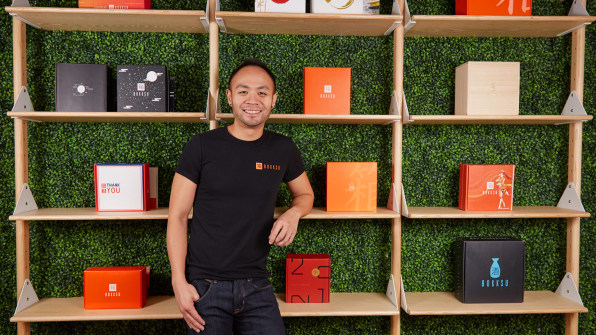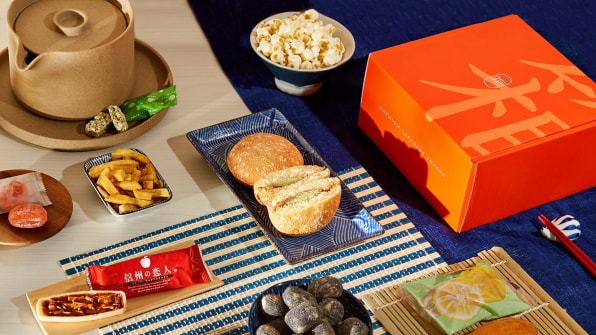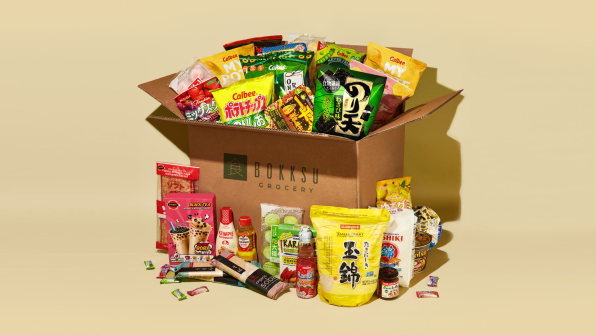- | 9:35 am
Beyond Pocky: This online market sells some of Japan’s tastiest and most authentic snack foods

In late January, Bokksu—a digital marketplace and subscription service for Japanese snacks and staples—announced a $22 million Series A, led by Valor Siren Ventures, the food-centric fund from Valor Equity Partners and Starbucks. When celebrating the funding round, founder Danny Taing also noticed that, as a gay Asian man, he had never seen an entrepreneur who looked like him get a similar venture backing.
As he grows Bokksu, Taing says he wants to reach out to other LGBTQ founders from underrepresented backgrounds about the fundraising process. “I hope it has a ripple effect,” he says. “I’ll be speaking out a lot more about this.”

[Photo: courtesy Bokksu]
Before Taing founded Bokksu in 2015, he spent several years living in Tokyo and working for e-commerce giant Rakuten. “It was a traditional, hierarchical, conservative company,” he explained. “I went back into the closet for the first time since high school.”
While facing personal challenges during his four years abroad, Taing, who is Cambodian-Chinese-American but studied Japanese during his undergrad years at Stanford, still followed his long-time passion for Japanese culture and cuisine. When he returned to New York (“where I could be my whole authentic self”) to pursue a degree in computer science at Columbia, Taing developed a concept to bridge cultures through authentic Japanese snacks. Specifically, the small-maker ones he couldn’t find at any Asian market, even in New York. (“It was mostly Pocky and Hi-Chew.”)
Bokksu launched in 2016 as a subscription service, shipping 14-15 Japanese snacks from different regions across the country. Every box arrives with a small pamphlet, walking the consumer through each snack and its maker, and each item is strategically picked for taste and aesthetic value. In short: “It needs to be super freaking delicious,” Taing said. “And it can’t just be for shock value or have Hello Kitty on it.”

[Photo: courtesy Bokksu]
I received Bokksu’s welcome box, a 22-item selection of candies, snacks, and a few sachets of ridiculously delicious green tea. Among the mix: Tottori 20th Century Pear Fromage Biscuits (as rich as they sound); Edamame Senbei (crunchy, nutty little crackers); and the elusive house-label White Strawberry, a freeze-dried, white chocolate-infused strawberry. Yes, it’s just as unreal as it sounds, and Bokksu is the only seller in America. Subscriptions start at $39.95 per month.
In 2018, the company expanded with the launch of Bokksu Market, offering a la carte shopping of their 500-plus hand-picked SKUs—ranging from glassware to, by far my favorite category anywhere, instant foods—and added online Asian groceries via Bokksu Grocery in 2021. By 2021, Bokksu, as a whole, became profitable—sending Taing out to fundraise. (TechCrunch pegs the company at a $100 million valuation.)

[Photo: courtesy Bokksu]
With the Series A under his belt, Taing is looking ahead, noting his relief that pandemic- and supply chain-related shipping setbacks are largely past them. The company, which has grown to around 40 employees across New York and Tokyo, is looking into private label and co-branded products for Bokksu Grocery, while diversifying and expanding the offerings in their Market and subscription box pipelines. But also, Taing said his goals include staying connected with other Asian DTC founders—like Omsom and Sanzo—as they continue to grow and cheer each other on. (Omsom founder Vanessa Pham was an early commenter to Taing’s LinkedIn post: “SO PROUD OF YA’LL!”)“I bootstrapped for so long,” Taing says, noting that there was initial skepticism for the business, which has delivered more than a million boxes so far. “I tried talking to early investors in 2017 and 2018 and everyone just looked at me and laughed. Like, ‘Oh that’s so niche.’ They saw an Asian founder doing a Japanese business and said, ‘You’ll get a thousand subscribers.’”
Fast Company‘s Recommender section is dedicated to surfacing innovative products, services, and brands that are changing how we live and work. Every item that we write about is independently selected by our editors and, whenever possible, tested and reviewed. Fast Company may receive revenue from some links in our stories; however, all selections are based on our editorial judgment.





































